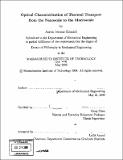Optical characterization of thermal transport from the nanoscale to the macroscale
Author(s)
Schmidt, Aaron Jerome, 1979-
DownloadFull printable version (19.25Mb)
Other Contributors
Massachusetts Institute of Technology. Dept. of Mechanical Engineering.
Advisor
Gang Chen.
Terms of use
Metadata
Show full item recordAbstract
The thermal properties of thin films and material interfaces play an important role in many technologies such as microelectronics and solid-state energy conversion. This thesis examines the characterization of thermal transport over length scales from nanometers upward in solids and liquids using pump-probe optical techniques. The design and implementation of a system that is uniquely suited to thermal measurements is described in detail, and the theory for interpreting the measurement results is developed using a linear systems approach, accounting for pulse accumulation effects and anisotropic thermal properties. Cross-plane thin film and bulk thermal conductivity measurements spanning more than two orders of magnitude are presented, along with a discussion on the importance of sample preparation on thermal boundary conductance and thermal conductivity measurements. An approach for measurement of in-plane thermal properties of anisotropic thin films is presented, and as a demonstration the method is used to extract both the cross-plane and in-plane thermal conductivity of highly ordered pyrolytic graphite. In addition, the measurement techniques are extended to liquids, providing a way to measure liquid volumes less than 500 nm thick as well as solid-liquid thermal interface conductances. Finally, optical techniques for the study of nanofluids are discussed. Transmission pump-probe measurements on gold nanorods in suspension are presented. The heat transfer dynamics of the rods are measured, and the critical role played by surfactants in the thermal transport between the rod and the surrounding fluid is studied systematically. An optical transient grating technique is used to explore the bulk thermal and viscous properties of nanofluids. (cont.) Thermal conductivity measurements show that the observed thermal conductivity enhancement of nanofluids is repeatable and is not a function of the measurement technique, while acoustic attenuation measurements indicate that the nanoparticles do not form clusters in solution.
Description
Thesis (Ph. D.)--Massachusetts Institute of Technology, Dept. of Mechanical Engineering, 2008. Includes bibliographical references (p. 171-181).
Date issued
2008Department
Massachusetts Institute of Technology. Department of Mechanical EngineeringPublisher
Massachusetts Institute of Technology
Keywords
Mechanical Engineering.